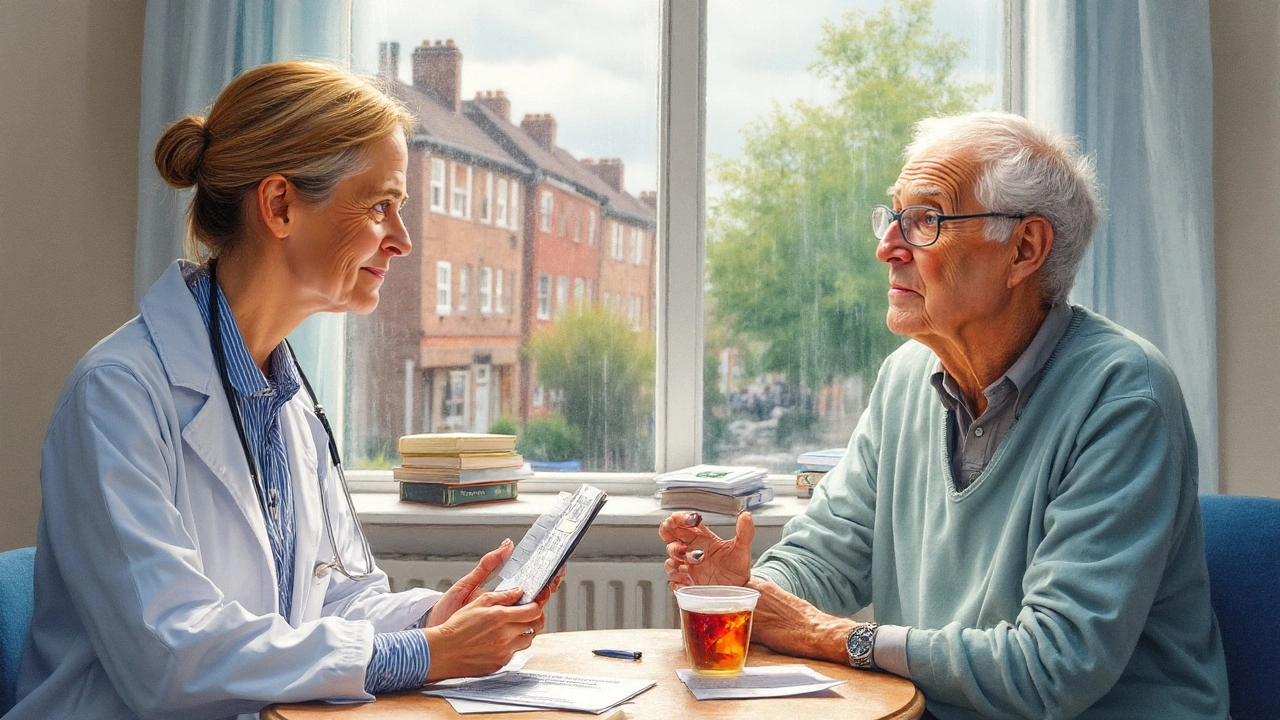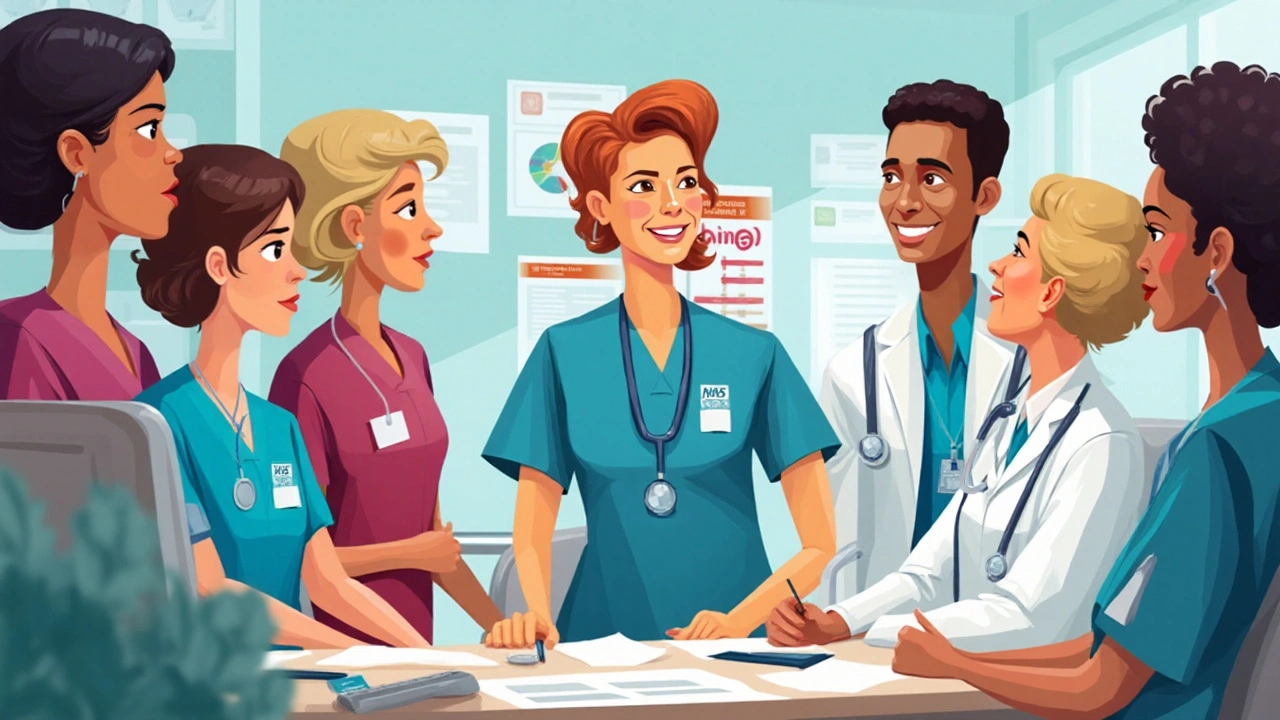
Imagine waking up on a grey Monday feeling a tickle in your throat and a thumping headache. You’re not alone if your first thought is: “Should I see my GP?” But what exactly does ‘GP doctor’ mean? It sounds straightforward, but the role of a General Practitioner comes with a surprising amount of depth. Some people think GPs only deal with colds and write prescriptions, but their real role goes way beyond that. They’re the unsung heroes of our healthcare system—the first stop for anything from mysterious rashes to managing diabetes or helping with mental health.
Who is a GP Doctor? Breaking Down the Basics
Let’s start with the foundation: what makes a GP doctor different from all the other medical professionals? GP stands for ‘General Practitioner,’ which means these doctors don't just stick to one area of medicine—they're trained to handle all kinds of issues people face, no matter their age, gender, or background. You’ll usually find them working at your local surgery or health centre, acting as the gateway into the bigger healthcare world.
This is how the process goes: if you’re feeling unwell, you book an appointment with your GP. They listen to your symptoms, take a look, and then—depending on what they find—either treat you directly or arrange for you to see a specialist. Unlike hospital consultants, GPs don’t have one narrow focus. One minute they might be seeing a child with asthma, and the next, an older adult with high blood pressure. That variety keeps their work both fascinating and challenging.
In the UK, it takes about ten years of study and training before a person can become a GP—a mix of university, medical school, and hands-on placements. After all that, they’re registered with the General Medical Council (GMC), making them fully qualified doctors. GPs often keep learning throughout their careers to stay on top of new treatments, especially since guidelines keep changing (like NICE guidelines for the UK).
Many families have the same GP for years, which builds trust and a sense of safety. Statistics from the NHS in 2024 showed that around 90% of healthcare in the UK begins with a GP appointment. That’s a huge amount of responsibility. It means GPs are the frontline for spotting health trends, from seasonal flu outbreaks to the early signs of cancer. Catching problems early can make all the difference, and GPs are trained to see the bigger picture instead of just isolated symptoms.
GPs also manage long-term conditions—think diabetes, asthma, or arthritis—by monitoring symptoms, reviewing medications, and checking the patient’s wellbeing over months or even years. They’re often the anchor that helps people cope with health worries over time. It’s a unique relationship because GPs don’t just look after the body, but they also care for the mind. They’re often the first port of call for people struggling with anxiety, depression, or stress.
Just to make it tangible, here’s a quick glance at what GPs might handle in a single day:
- Diagnosing coughs, fevers, or stomach pain.
- Carrying out routine health checks, like blood pressure or cholesterol screenings.
- Providing vaccinations and travel advice.
- Dealing with sprains and minor injuries that don’t require an A&E trip.
- Managing long-term meds for things like high blood pressure or asthma.
- Referring patients to physios, mental health services, or specialist hospital clinics.
- Following up after hospital treatment.
- Offering support to carers and families.
If you think GPs just hand out antibiotics, think again. They weigh up what’s best for the patient using all kinds of clinical guidelines. Plus, they can issue sick notes for work or school, fill out health forms, and even help with the paperwork for things like life insurance (yes, really!). They’re decision-makers in ways most people don’t see.

GPs in Action: Real-Life Scenarios and Surprising Facts
Step into a GP’s shoes for a day, and you’d quickly see why this job is never boring. Their diaries fill up fast—most GPs see about 40 patients a day, and every case is different. It could be a worried parent, a teenager struggling with sleep, or someone who’s just not feeling right but doesn’t know why. The best GPs pick up on small clues—an unusual mole, out-of-character fatigue, or mood changes—that can turn out to be vital.
GPs also manage preventive care. For example, they check for early signs of heart disease, diabetes, or cancer through screenings and blood tests. They don’t wait for problems to get big—they act early. That’s why the *NHS Health Check* (offered to everyone aged 40–74 every five years) is almost always carried out by GPs or their teams.
Let’s talk numbers for a second. Here’s a look at some recent data that highlights just how critical GPs are in the UK:
| Metric | 2021 | 2024 |
|---|---|---|
| Average daily GP appointments | 1.35 million | 1.46 million |
| Percentage of face-to-face consultations | 52% | 68% |
| Average time per appointment | 9.2 minutes | 10.5 minutes |
| Referrals to specialists each week | 600,000 | 690,000 |
Since the pandemic, GPs have adapted quickly—offering online consultations, phone calls, and even video chats. That shift means you can get advice even if you’re stuck at home with a toddler or can’t get time off work. Many clinics rolled out same-day appointments, and now you can sometimes book a quick chat with your GP via a simple click on your clinic’s website.
One big myth: that GPs only treat physical issues. That’s way off. They’re also trained to handle mental health. If you’re struggling with anxiety, depression, or stress, your GP can be the start of your support network. Often, they listen without judgment and can direct you to local therapists, specialist nurses, or help set up counselling. Since 2020, mental health has become an even bigger part of GP work – in 2023, GPs across England handled over 6 million mental health-related appointments.
GPs aren’t working alone either. They’re supported by teams—nurses, healthcare assistants, pharmacists, and sometimes even paramedics or social workers. The approach is becoming more team-based so patients can get all the help they need faster.
You might not know this, but GPs have to juggle strict NHS targets, funding pressures, and paperwork mountains (they fill out lots of forms you never see). Yet, the best ones still make time to follow up with vulnerable patients, or spend a few extra minutes with someone who’s just had tough news.
Got a travel vaccine question? Seeing changes in your skin? Need advice on living with menopause? GPs handle it all. They help you understand test results, make lifestyle changes, and keep up-to-date with necessary jabs. Every family has stories about a quick-thinking GP who caught a hidden illness early or gave support when it mattered most.

When and How to See Your GP: Practical Tips and What to Expect
Not sure when you should actually see your GP? A lot of people are hesitant, worried their problem seems "too small" or that they're wasting the GP's time. Here’s the reality: if it’s affecting your health or peace of mind, your GP wants to know. They’d rather see you early than pick up serious illness later. So, that niggling cough, mysterious pain, or low mood that won’t budge? Worth a visit.
Here’s a practical rundown of what counts as GP “territory” versus when you should rush to A&E (the emergency room):
- GP Doctor—ongoing aches, coughs or colds, headaches, skin rashes, contraception advice, medication reviews, mild mental health worries, minor injuries, routine check-ups, chronic conditions.
- A&E—chest pain, severe shortness of breath, serious bleeding, broken bones, sudden weakness or confusion, severe allergic reactions.
Booking an appointment is easier than it used to be. Most GP clinics let you call or use online systems. Many also leave slots open for same-day urgent queries. If you can’t get an appointment quickly enough, you might be offered a call-back instead—that way your GP can decide if you need to come in or if you can be helped over the phone. If you work awkward hours, some clinics offer evening or weekend appointments too, and some allow you to contact your GP using apps like AskMyGP or Patient Access.
Things to remember before your appointment:
- Write down a list of symptoms, even if they seem unrelated.
- Check if you need to bring a urine sample or medication list.
- Arrive a few minutes early—there’s often paperwork on first visits.
- If you’re worried about forgetting things, take notes during your chat or bring someone you trust.
- Be honest about lifestyle habits—your GP isn’t there to judge.
During your appointment, your GP will often ask a lot of questions. It's not because they're nosy—it’s all about making sure nothing gets missed. Don’t be surprised if they check your blood pressure, ask about family history, or suggest a blood test. GPs are your detective, advocate, and partner in health, all rolled into one.
After your appointment, you might get medication, lifestyle advice, or a follow-up plan. Sometimes you’ll need referrals for scans or specialist input, which your GP will arrange. If tests come back with results you don’t understand, just ask—your GP can break down what it all means in plain English.
If you haven't seen your GP in a while, it’s worth checking in, especially if you’re due health checks like cervical smears, blood pressure reviews, or long-term condition monitoring. Some clinics text reminders, but don’t be afraid to call and double-check. Staying connected with your GP is the backbone of keeping your health on track, especially as you get older or if you have ongoing conditions.
Quick tip: if you don’t feel comfortable or don’t “click” with your GP, you can ask to see another one at your practice. Good communication matters—a recent NHS survey found that patients who felt their GP listened properly were twice as likely to stick to advice and trust the health service.
One last thing: don’t underestimate how much GPs want to see you get better. Helping people day in, day out isn’t easy, but it’s why most GPs chose this job. That mix of problem-solving, care, and community impact? It never gets old.